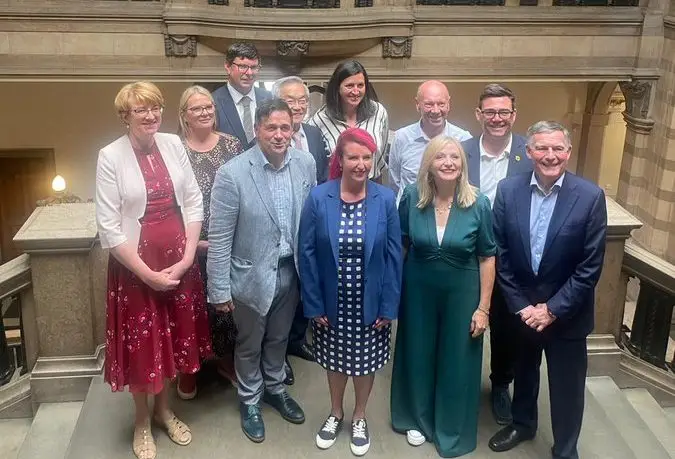Industry leader Juergen Maier has called for a comprehensive overhaul of the UK’s transport policies.
His report, launched in Bradford, sets out a vision for a greener and more inclusive transport network.
Juergen Maier’s Vision for Transport
Juergen Maier, an influential industrialist, has emphasised the need for a more connected, affordable, and high-capacity transport network in his newly released report, The Rail and Urban Transport Review. Launched in Bradford, the report was supported by key figures in the transport sector, including Transport Secretary Louise Haigh and Metro Mayors Tracy Brabin and Andy Burnham. Maier’s vision is to reshape the UK’s transport infrastructure to be greener, more inclusive, and future-ready.
He criticised the current approach to transport policy, labelling it as haphazard and inefficient. According to Maier, the present ‘chop and change’ attitude has led to significant ambiguity, increased costs, and a lack of investment. He believes that the report’s recommendations provide a clear roadmap for the government to drive substantial economic, social, and environmental benefits in partnership with the private sector.
Support from Government and Key Stakeholders
Transport Secretary Louise Haigh echoed Maier’s sentiments, arguing that 14 years of inconsistent transport policies have left the public disillusioned. She praised the review for its comprehensive assessment of the challenges and opportunities facing Britain’s transport infrastructure. According to Haigh, the government is committed to delivering value for taxpayers while accelerating the completion of transport projects to enhance the economy across the country.
Jason Prince, Director of the Urban Transport Group, also voiced his support for the review. He highlighted the importance of good urban transport in creating a stronger, greener, and fairer economy. Prince noted that the review’s final recommendations were a testament to the collective ambition of the sector to deliver better transport services.
Key Themes Addressed in the Review
The review identified five key themes crucial for the future of the UK’s transport sector: long-term planning, accelerated infrastructure delivery, public-private financing partnerships, strategic planning involvement from Mayors, and incorporating the voices of transport users and workforce in future plans.
Maier’s report underscored the necessity of long-term planning to avoid the pitfalls of short-term solutions. He argued that only through sustained and well-thought-out strategies could the UK achieve its transport goals. The inclusion of Mayors in strategic planning was also emphasised as a means to ensure regional needs and perspectives are adequately addressed.
Additionally, the report called for stronger public-private financing partnerships to mobilise the necessary resources for ambitious transport projects. It suggested that involving unions and workforce representatives would ensure that the voices of those directly impacted by transport policies are heard.
Challenges Facing the UK Transport Infrastructure
The UK’s transport infrastructure faces numerous challenges, including outdated systems, funding constraints, and growing environmental concerns. Maier’s review highlighted these issues, stressing that overcoming them requires a multi-faceted approach involving various stakeholders.
Environmental sustainability was a major focus of the review. It stressed the importance of transitioning to greener transport options to reduce the sector’s carbon footprint. This includes investing in electric and hybrid vehicles, as well as enhancing public transport systems to make them more environmentally friendly.
Funding is another critical challenge. The report suggested that innovative financing solutions, such as public-private partnerships, could help bridge the funding gap for large-scale transport projects.
The Role of Technology and Innovation
Technology and innovation were identified as key drivers for the future of transport. The review called for increased investment in cutting-edge technologies to improve the efficiency and sustainability of the transport network.
Maier pointed out that adopting advanced technologies could lead to significant improvements in areas such as traffic management, commuter experience, and operational efficiency. For instance, smart traffic management systems could help reduce congestion and improve traffic flow.
The review also highlighted the potential of autonomous vehicles and other emerging technologies to transform the transport landscape. While acknowledging the challenges of implementing such technologies, it emphasised their long-term benefits.
Recommendations for a Future-Ready Transport Network
The review offered several recommendations aimed at creating a future-ready transport network. These included prioritising long-term investments in infrastructure, fostering public-private partnerships, and promoting the adoption of green technologies.
Maier stressed the need for a consistent and long-term approach to transport policy, arguing that only through sustained efforts could the UK achieve its transport objectives. The report also called for greater involvement of regional authorities and stakeholders in planning and decision-making processes.
Furthermore, the review suggested that a focus on green technologies and sustainability would not only benefit the environment but also create economic opportunities and improve the quality of life for citizens.
Conclusion and Future Outlook
The ambitious vision outlined in Juergen Maier’s report calls for transformative changes in the UK’s transport infrastructure. With the support of government and key stakeholders, these recommendations could pave the way for a more efficient, sustainable, and inclusive transport network.
Ultimately, the success of this vision depends on the collective efforts of all involved parties. By prioritising long-term planning, embracing innovation, and fostering collaboration, the UK can overcome the challenges facing its transport sector and achieve its future goals.
The ambitious vision outlined in Juergen Maier’s report calls for transformative changes in the UK’s transport infrastructure.
With the support of government and key stakeholders, these recommendations could pave the way for a more efficient, sustainable, and inclusive transport network.


